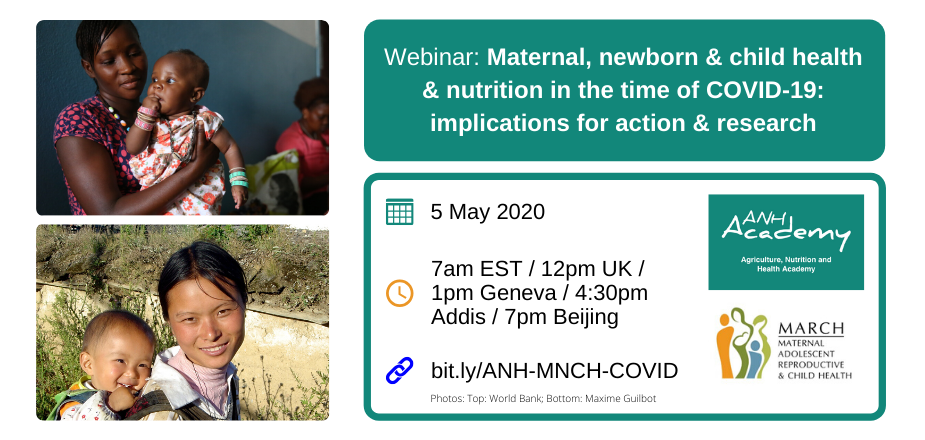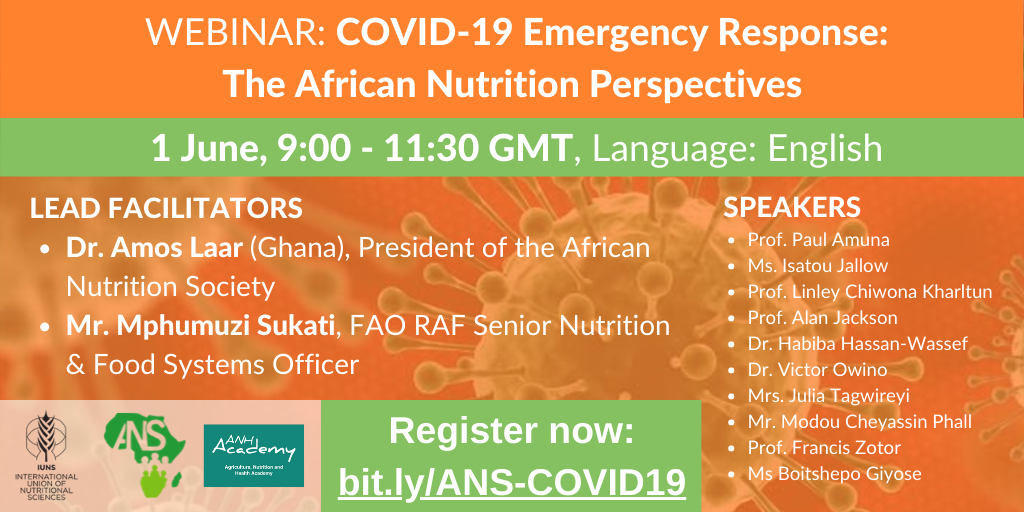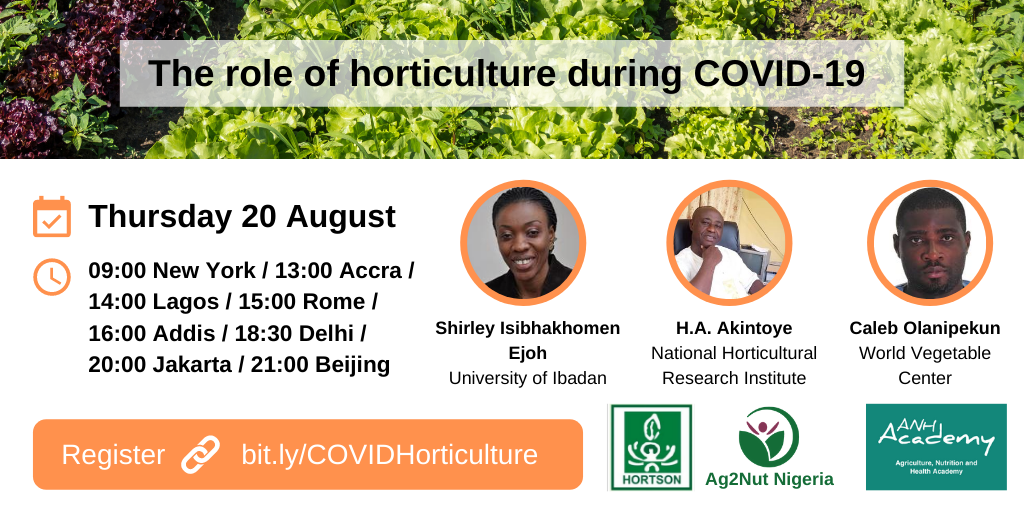
Note: Some audience questions not answered during the webinar have been answered by our panelists and those answers can be found below in the "Audience Questions Answered" section.
COVID-19 is placing unprecedented strain on health and food systems, threatening decades of progress toward equity, health and nutrition for women and children across the world. From ensuring early initiation of breastfeeding and adequate nutrition for women and children in the first 1,000 days, to routine immunisation and mental health programmes, COVID-19 poses myriad risks to essential interventions and quality of care across the world.
How should communities of research, practice and policy respond to this crisis and what steps are being taken by funders and multilateral organisations to better mitigate its effects?
Join us for a webinar to chart the way forward for maternal, newborn and child health and nutrition. Speaker remarks will be followed by a 30 minute Q&A/community discussion. This webinar will be recorded and uploaded afterward. Please reach out if you have any questions.
Moderator:
-
Suneetha Kadiyala, London School of Hygiene & Tropical Medicine Associate Professor of Nutrition-Sensitive Development
Speakers:
- Shawn Baker, USAID
Chief Nutritionist
Multisectoral programmes for maternal and child health and nutrition during a pandemic - Laurence Grummer-Strawn, WHO
Coordinator of the Food and Nutrition Actions in Health Systems Unit
Breastfeeding and COVID-19: WHO guidance - Joy Lawn, London School of Hygiene & Tropical Medicine
Professor of Maternal, Reproductive and Child Health
COVID-19 pandemic: direct and indirect effects on maternal and newborn health - Anuradha Narayan, UNICEF China
Chief of Health and Nutrition/WASH
China's experience: Sustaining maternal, newborn and child health services during COVID-19
This webinar is co-hosted by the Agriculture, Nutrition and Health (ANH) Academy and the London School of Hygiene & Tropical Medicine (LSHTM) Centre for Maternal, Adolescent, Reproductive, & Child Health (MARCH).
Resources
- Presentation slides:
- Joy Lawn: COVID-19: direct and indirect effects on maternal, newborn and child health
- Anuradha Narayan: Sustaining maternal, infant and childcare services in the time of COVID-19 –– Experience from China
- Laurence Grummer-Strawn: Breastfeeding and COVID-19
- Shawn Baker: Multisectoral programmes for maternal and child health and nutrition during a pandemic
- ANH Academy welcome slides
- ANH Academy COVID-19 resources - add your point of view to our community map of global nutrition/food systems perspectives on COVID-19
- MARCH Centre resources:
- 5 May is International Day of the Midwife and Hand Hygiene Day, participate on social media with the hashtags: #HandHygiene #SupportNursesandMidwives
- Register for the MARCH Centre's new webinar series, Survive and Thrive: Transforming Care for Every Small and Sick Newborn, starting 20 May
- Global survey on health and safety of health workers in COVID-19
- LSHTM Viral Podcast S1E23: New virus, new life: Will this pandemic affect pregnancy?
- World Immunization Week 2020 webinar series from LSHTM
- WHO resources:
- USAID resources:
- UNICEF resources:
- Universal Vitamin A supplementation for preschool-aged children in the context of COVID-19: GAVA consensus statement
- UNICEF/WFP/FAO Interim guidance note: Mitigating the effects of the COVID-19 pandemic on food and nutrition of schoolchildren
- Brief: Protecting Maternal Diets and Nutrition Services and Practices in the Context of COVID-19
- UNICEF COVID-19: Resources for practitioners
Audience Questions Answered
-
"In regards to misinformation and the anxiety surrounding recommendations, how can we monitor and address this? Which stakeholders are important here?"
-
Shawn Baker: In the COVID-19 response period there will be a number of pressing public health messages that need to reach the entire population. Nutrition messaging must target those in the first 1000 days rather than solely broadcast via mass media. Given the constraints of face-to-face interactions in the context of social distancing, SBC strategies should rely on alternative, non-contact means to provide counseling and support. This might include the use of mobile technology, social media, or mass media, or using essential outlets that remain open as entry points. Both breastfeeding and complementary feeding Social and Behavior Change (SBC) should include hygiene promotion as safe hygiene behaviours, especially hand washing with soap at all critical times and practicing safe food preparation/ handling, will reduce risk of transmission of COVID-19 as well as any food-borne disease.
-
-
"Can panellists comment on their experiences with COVID-19, nutrition, HIV and TB that impact Africa and Asia monumentally?"
-
Shawn Baker: This is a new virus and its impacts and the impacts of measures taken to contain it are hitting virtually all countries and populations. In many ways it is unprecedented. However, there are parallels to other crises that can inform our understanding of the impacts on nutrition. We know that when lower income consumers face disruption of purchasing power they prioritize staples and decrease consumption of more nutritious foods. The Ebola crisis in West Africa showed a steep decline of services delivered through the health system. Faced with new priorities such as HIV, it is difficult to get political attention and financing prioritized for nutrition. We have seen in most crises that they exacerbate pre-existing vulnerabilities. The COVID-19 crisis makes focusing on nutrition and even more urgent development imperative.
-
-
"The need for collecting data has been highlighted from the first presentation, how can data collection be done in communities with limited access to mobile/internet connectivity?" A few resources on data collection can be found here:
-
RECOVR Questionnaire Repository by RECOVR Research Hub (IPA et al)
-
Transitioning to CATI: Checklists and Resources by J-PAL South Asia
-
Practical tips for switching to phone surveys by Mathematica
- Data Quality Protocol by J-PAL South Asia
-
Join the conversation on social media
Share quotes from the speakers, reflections, screenshots and more on social media. Use these hashtags and handles on Twitter:
- Twitter handles:
- ANH Academy: @anh_academy
- MARCH Centre: @MARCH_LSHTM
- Joy Lawn: @JoyLawn
- LSHTM: @LSHTM
- WHO: @WHO
- UNICEF East Asia Pacific: @UNICEF_EAPRO
- USAID: @USAID
- Hashtags: #ANHCOVID19 #COVID19 #nutrition #maternalhealth #MNCH #childhealth #newborn #coronavirus
Speakers
Shawn Baker, USAID
Chief Nutritionist
Shawn K. Baker is the Chief Nutritionist for the U.S. Agency for International Development (USAID). In this position, he chairs the Agency’s Nutrition Leadership Council, oversees the vision and strategy of the Agency’s Center for Nutrition in the Bureau for Resilience and Food Security, and coordinates related efforts across USAID. He also guides USAID’s investments and engagement with partners to address malnutrition in developing countries. Prior to joining USAID, Baker was the first director of nutrition at the Bill and Melinda Gates Foundation. He has over 30 years’ experience in global public health nutrition, including 25 years living in sub-Saharan Africa and South Asia.
Laurence Grummer-Strawn, WHO
Coordinator of the Food and Nutrition Actions in Health Systems Unit
Laurence Grummer-Strawn is the coordinator of the Food and Nutrition Actions in Health Systems unit at the World Health Organization. Until December 2014, he served as chief of the Nutrition Branch at the U.S. Centers for Disease Control and Prevention (CDC). Having earned his PhD from Princeton University, he worked at CDC for over 23 years, in the areas of Reproductive Health and Nutrition. He is an epidemiologist who has published over 150 scientific publications. He is recognized internationally for his work on vitamin and mineral deficiencies, breastfeeding policy, and development of both the CDC and the WHO Growth Charts. At WHO, Dr. Grummer-Strawn oversees micronutrient malnutrition, undernutrition and infant and young child feeding. He leads the Baby Friendly Hospital Initiative, the Code of Marketing of Breast-milk Substitutes, and the Global Breastfeeding Collective.
Joy Lawn, London School of Hygiene & Tropical Medicine
Professor of Maternal, Reproductive and Child Health
Joy has lived and worked in many African countries, including as a lecturer and neonatalogist in Ghana in the 1990s. She shifted to public health and global estimation working at the WHO Collaborating Center, CDC Atlanta, USA (1998-2001), and then at the Institute of Child Health, London, UK (2001-2004), completing a Masters of Public Health at Emory University, Atlanta and a PhD in perinatal epidemiology at University College London, UK. For ten years she was Director Global Evidence and Policy for Saving Newborn Lives (SNL) programme of Save the Children (Gates Foundation funded) working with governments and partners to scale up and evaluate newborn care including leadership in Lancet Every Newborn series and Action Plan, leading to the first SDG on neonatal survival.
Anuradha Narayan, UNICEF China
Chief of Health and Nutrition/WASH
Anuradha holds a dual Master’s degree in World Hunger, Malnutrition and Development, and International Relations from Tufts University in Massachusetts, USA. Anuradha joins UNICEF China Office from UNICEF Bangladesh, where she was the Chief of Nutrition. Before Anuradha joined UNICEF, she was with Helen Keller International for six years as their Deputy Regional Director based in Nairobi, Kenya and then Deputy Director at SPRING - a USAID funded global nutrition program based in Washington DC. Previously Anuradha also worked with Save the Children for seven years. Her career spans over 20 years in public health, population services, nutrition, leadership and management across four continents.
Suneetha Kadiyala, London School of Hygiene & Tropical Medicine
Associate Professor of Nutrition-Sensitive Development
Suneetha is an Associate Professor in Nutrition-Sensitive Development at LSHTM. She is a nutritionist with research interests focusing on the intersection between agriculture/food systems and food security, gender and nutrition. Her expertise spans programme design, operations research and theory-based complex programme impact evaluations; and innovative methods and metrics in agriculture-nutrition research. She is the Principal Investigator of IMMANA (Innovative Methods and Metrics for Agriculture and Nutrition Actions), a DFID-funded partnership to stimulate the development and application of scientifically sound methods and metrics in agriculture, health and nutrition research. IMMANA includes the Agriculture, Nutrition and Health (ANH) Academy, a global network of researchers working at the nexus of agriculture, nutrition and health.





